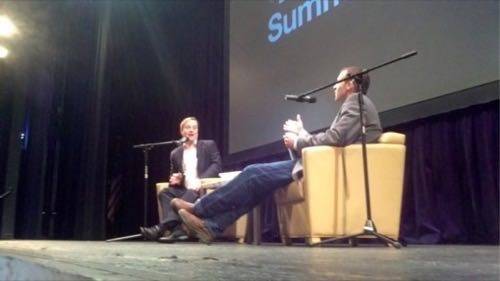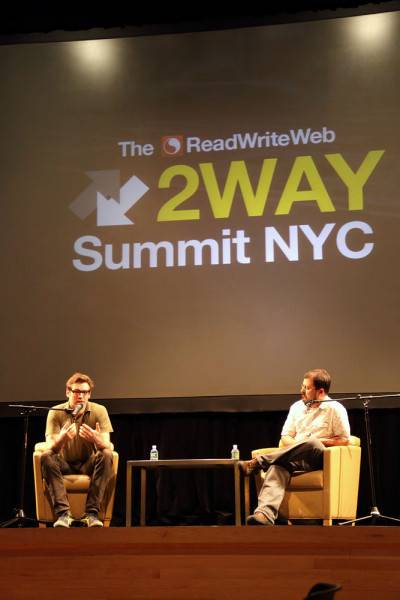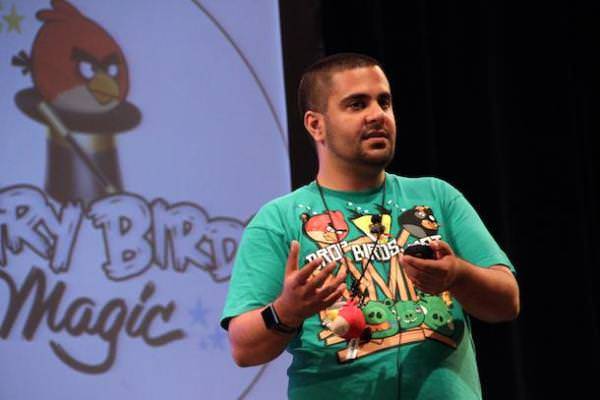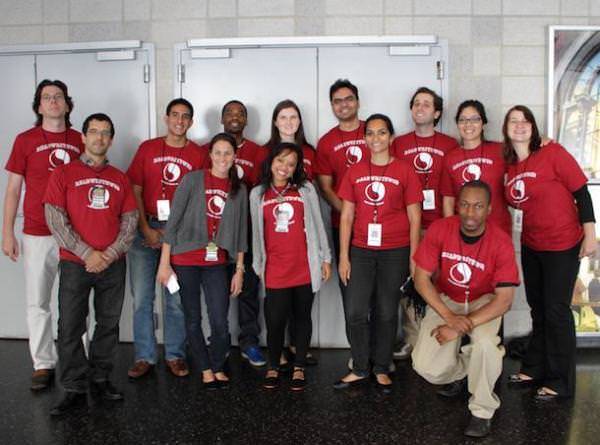This week we successfully staged our latest event, the ReadWriteWeb 2WAY Summit. A series of conversations mirroring the two-way nature of the Web, we welcomed speakers like danah boyd, Jason Calacanis and Baratunde Thurston. We also introduced breakout sessions spotlighting specific issues and speed geeking demos by a host of intriguing companies and teams.

Now that the dust has settled, we’d like to offer you a chance to revisit the event or, if you were unable to attend, benefit from it anyway by reading and watching our coverage of the speakers and ideas that powered the gathering.
Speed geeking at the RWW 2WAY Summit
Fred Wilson on “Content Shifting”: How Our Multiple Devices & Platforms Change Our Media Consumption
Earlier this year, investor Fred Wilson observed this phenomenon that he called “content shifting,” the desire and (sometimes) the ability to shift content across a variety of Internet platforms to a variety of connected devices. At ReadWriteWeb’s 2Way Summit, Wilson gave a keynote on content shifting and how this is changing the way in which we consume media.
Wilson believes that content shifting will provide major opportunities for investors and entrepreneurs as it’s currently “still too hard to do this kind of thing.”
Andy Carvin Tweets the World: Building Networks and the Future of Journalism
The fundamental methods journalists use to find stories and engage with sources is changing. On the cusp of the media revolution is National Public Radio senior strategist Andy Carvin and his use of social media and crowd sourcing to tell the story of turmoil in the Middle East … from 5000 miles away.
Carvin used Twitter to build a network that now keeps him on top of the news that comes out of the Middle East and in doing so has shown the media industry a new way to be a reporter. The question becomes: is the future of the news industry tied to the technology or is technology an enabler to creating human networks that spread information?
Calacanis in conversation with Abraham Hyatt

Jason Calacanis: “Blogging Is Dead” & Why “Stupid People Shouldn’t Write”
“Blogging is largely dead.”
“There are a lot of stupid people out there … and stupid people shouldn’t write.”
“There needs to be a better system for tuning down the stupid people and tuning up the smart people.”
Serial entrepreneur and publisher Jason Calacanis has never been opposed to saying what is on his mind. In fact, it is the characteristic that has helped him rise to the top of the Internet publishing world. He sat down with our managing editor Abraham Hyatt onstage at the ReadWriteWeb 2WAY Summit on Monday and dished on his thoughts about the state of publishing, what Google’s Panda initiative is doing to websites and what Web 3.0 will be about.
Exploiting Social Media with The Onion’s Baratunde Thurston
Social media is supposed to empower users, giving them a platform to communicate more broadly. But as The Onion’s Baratunde Thurston points out, social media also provides an opportunity for some great humor and pranking.
From live hate-tweeting the premier of the Twilight movies to creating rallies in support of Foursquare mayorships, Thurston addressed some of the “case studies of ridiculousness” that plague – or bless – us online.
Dixon in conversation with Marshall Kirkpatrick

Chris Dixon: Hunch, Taste Graphs & the Link Between Lettuce & Politics
During the 2008 Presidential campaign, John McCain accused Barack Obama of being “the guy who worries about the price of arugula,” a suggestion that Obama was an elitist. Many scoffed at the remark, but according to Hunch CEO and co-founder Chris Dixon, liberals do prefer arugula while conservatives opt for iceberg lettuce. The connection between lettuce preferences and political orientation is something that Hunch has uncovered through its taste graph and recommendation engine, something that Dixon describes as “the most sophisticated system ever built for predicting human preferences.”
Dixon sat down with our own Marshall Kirkpatrick to talk about how Hunch has built its taste graph and how this sort of recommendation engine may shape the future of a more personalized Web.
Foursquare’s Next Project: Surface More Mobile Location Data
In March, 16.7 million used location check-ins with services like Facebook Places, Foursquare and Gowalla, with 75% coming via mobile phones. In the next year, Foursquare is going to focus on mobile innovation and how to use all the capabilities of the smartphone to surface data to give users more utility with location services.
Foursquare Head of Product Alex Rainert spoke with Dan Patterson from ABC News on the main stage at the ReadWriteWeb 2Way Summit and we live-streamed it. We’ll have the video of this event and others up on the site soon.
Flipboard Will Develop for the iPhone Next, No Android App in Sight
What is next for Flipboard? The startup is rapidly growing, hiring new employees and forging new partnerships with publishers to create dynamic new content platforms.
The next step is to make a jump off the iPad and start monetizing the company. These are easier goals to say than to do, but CEO Mike McCue and does not want to jump too far too fast. As such, do not expect to see an Android version anytime soon as the iPhone is the next platform in store for Flipboard. He spoke about these and other issues at the summit.
W3C Launches Community Groups to Help Create Web Standards
“We think of our stakeholders as everybody who uses the Web, which is a pretty big set,” W3C’s Jeff Jaffe told attendees at the 2Way Summit. “What it means to get started is that they get a little bit of infrastructure, some connectivity and so forth. We also give a little bit of coaching which leads them to the path of creating a standard.”
The consortium wants to eliminate groups creating their own individual standards that are incompatible with each other. The idea of community groups is to bring all stakeholders under one umbrella during the process of creating a standards.
Ramine Darabiha, product manager, Angry Birds Magic

Angry Birds Coming Soon Everywhere (Literally)
Just when you thought Angry Birds had spread to every possible platform – iOS, Android, Facebook, Chrome – the game-maker Rovio is took the stage at the summit to make a new announcement, one that will take Angry Birds to a whole new place. In fact, Angry Birds will soon be everywhere. Quite literally.
With this new aspect, Angry Birds Magic, which will be rolling out in the coming weeks, the wildly successful puzzle game will become connected to the physical world.
Speed Geeking at the ReadWriteWeb 2WAY Summit
The RWW 2WAY Summit was not a pitch event, but that doesn’t mean it wasn’t a great opportunity for tech companies to showcase their products. So we invited a group of startups and established companies to present at our conference, a continuation of what’s become a tradition at ReadWriteWeb’s tech events: Speed Geeking.
Rather than taking turns on stage going through slides and talking about a product, speed geeking has startups presenting simultaneously. Audience members circulated from table to table, watching demos – not PowerPoints. The tech companies had five minutes to give their presentations and answer questions, and then a whistle was blown (or in this case, our own Marshall Kirkpatrick shouted “Time’s up”) and people migrated to another table. It was an interesting way for participants to see demos in a more casual (yet very high energy) situation. And it was a chance for companies to answer questions and get feedback from a wide range of tech enthusiasts.
As News Goes From Print to Pixels, The Onion Thrives
As many print media outlets continue to struggle to find their place in an increasingly digital ecosystem, the satirical newspaper The Onion has managed to not only make the most the Web and social media, but also continue to expand into new markets and new media.
A team of Onion staffers walked summit attendees through the publication’s history, from its fictitious beginnings in 1756 all the way to its modern experimentation with social media and its expansion into broadcast.
Our fantastic geekunteers: don’t stop believin’!

What I Learned From Our 2WAY Summit (Parts One and Two)
Our new Business Channels Editor David Strom, and a presenter on real-time communications at the summit, reflected on what he’d learned there of value to enterprise.
“One thing is pretty clear to me,” he noted. “Running a modern corporate Web site isn’t getting any easier. It isn’t just keeping up with the latest HTML5 tags and what features Microsoft and Mozilla are adding to their latest browsers (although both are worth tracking) – it is maintaining a complex ecosystem of a myriad of software tools, updating your corporate policies as new technologies take over the marketplace, finding people with the right skill mix and personalities to leverage new social media. Oh, and also understanding how the Web has infiltrated just about everything that we do these days.”
Miscellaneous
Take a gander at our Managing Editor Abraham Hyatt’s photogallery of the summit.
Speakers and attendees also took a host of photos during their time at the summit.
Here’s a link to the #rww2way Twitter stream.
Stay tuned for more coverage of the ReadWriteWeb 2WAY Summit. We have yet to sift through the tremendous amount of conversation, ideas, revelations and warnings we heard from our guests, panelists and participants.










